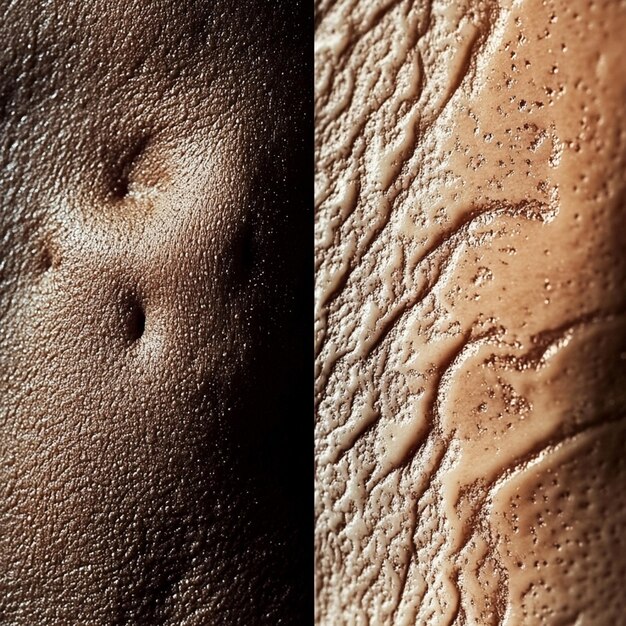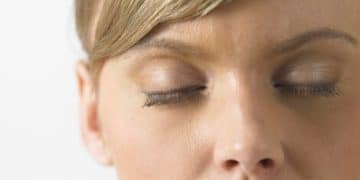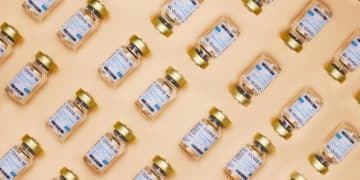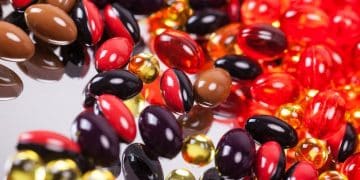Astaxanthin for Skin: Unveiling the Hidden Anti-Aging Benefits

Astaxanthin, a potent antioxidant found in certain marine algae, offers remarkable yet often overlooked benefits for skin health, including protection against UV damage, reduction of wrinkles, and improved skin elasticity.
Unlock the secret to radiant, youthful skin with insider knowledge about astaxanthin for skin health. This powerful antioxidant, derived from marine sources, is gaining recognition for its impressive anti-aging properties and ability to enhance skin’s natural defenses.
Understanding Astaxanthin: Nature’s Skin Guardian
Astaxanthin is a naturally occurring carotenoid pigment, giving vibrant red hues to various marine organisms like salmon, shrimp, and algae. Beyond its colorant properties, astaxanthin for skin health has emerged as a potent antioxidant, showing promise in protecting and rejuvenating the skin.
What Makes Astaxanthin Unique?
Unlike some antioxidants that become pro-oxidants after neutralizing free radicals, astaxanthin boasts a unique molecular structure that allows it to neutralize free radicals without becoming unstable. This makes it an exceptionally stable and efficient antioxidant.
- Superior Antioxidant Capacity: Astaxanthin’s antioxidant power is significantly stronger than other well-known antioxidants like Vitamin C and Vitamin E.
- Cell Membrane Protection: It spans the entire cell membrane, offering comprehensive protection against oxidative stress.
- Reduced Inflammation: Astaxanthin has anti-inflammatory properties, which can help soothe and calm irritated skin.
Astaxanthin’s protective nature stems from its capacity to quench singlet oxygen, scavenge free radicals, and prevent lipid peroxidation, all of which are primary contributors to skin aging and damage.
UV Protection Amplified: Astaxanthin’s Role
One of the most compelling benefits of astaxanthin is its ability to bolster the skin’s defenses against harmful ultraviolet (UV) radiation, acting as a natural internal sunscreen. By neutralizing free radicals produced by UV exposure, astaxanthin for skin health helps minimize sun damage and premature aging.

How Astaxanthin Shields Against UV Damage
Astaxanthin works by absorbing certain wavelengths of UV light and neutralizing the free radicals formed when UV radiation penetrates the skin. This process reduces inflammation, DNA damage, and collagen degradation associated with sun exposure.
- DNA Damage Control: By limiting UV-induced DNA damage, astaxanthin helps prevent mutations that can lead to skin cancer.
- Inflammatory Response Reduction: It reduces the production of inflammatory molecules, preventing sunburn and associated skin irritation.
- Collagen and Elastin Preservation: Astaxanthin safeguards collagen and elastin fibers from UV-induced breakdown, maintaining skin’s firmness and elasticity.
While not a replacement for traditional sunscreen, astaxanthin can supplement your sun protection strategy, offering an extra layer of defense from within.
In essence, astaxanthin promotes a robust defense against harmful UV radiation, mitigating damage and preserving the overall health and appearance of the skin.
Reducing Wrinkles and Fine Lines: The Anti-Aging Powerhouse
As we age, the appearance of wrinkles and fine lines becomes a common skin concern. Supplementing with astaxanthin can significantly reduce the appearance of these aging signs by promoting collagen production and protecting against collagen degradation, highlighting astaxanthin for skin health as a potent anti-aging ingredient.
Enhancing Collagen Production
Collagen is a vital protein that provides skin with its structure and elasticity. As collagen levels decline with age, skin loses its firmness, leading to wrinkles and sagging. Astaxanthin stimulates collagen production by activating key fibroblasts, the cells responsible for creating collagen.
Furthermore, astaxanthin inhibits enzymes that break down collagen, such as matrix metalloproteinases (MMPs), helping to preserve existing collagen stores.
Astaxanthin also improves skin hydration, reducing the appearance of fine lines and improving overall skin texture. Hydrated skin appears plumper and more youthful due to its increased water content.
In essence, astaxanthin’s unique ability to stimulate collagen production while inhibiting its breakdown ensures that skin maintains its firmness, elasticity, and youthful appearance.
Improving Skin Elasticity and Hydration: Astaxanthin’s Dual Action
Skin elasticity and hydration are critical for maintaining a youthful appearance, and astaxanthin for skin health excels in promoting both. Its ability to enhance skin’s moisture retention and improve its ability to stretch and bounce back contributes to a smoother, more supple complexion.

Boosting Skin Elasticity
Elasticity refers to the skin’s ability to stretch and return to its original shape. The protein elastin, along with collagen, is essential for maintaining this elasticity. Astaxanthin protects elastin fibers from damage caused by oxidative stress and inflammation, thereby preserving the skin’s ability to bounce back.
Astaxanthin reduces the activity of elastase, an enzyme that breaks down elastin, promoting the longevity and functionality of these critical fibers.
Enhancing Skin Hydration
Hydrated skin is plumper, smoother, and more resilient than dry skin. Astaxanthin improves skin hydration by strengthening the skin’s barrier function, which prevents water loss.
- Improved Barrier Function: Astaxanthin reinforces the lipid layer of the skin, reducing water evaporation and maintaining optimal hydration levels.
- Increased Hyaluronic Acid Production: It stimulates the production of hyaluronic acid, a natural humectant that attracts and retains moisture in the skin.
- Reduced Trans-Epidermal Water Loss (TEWL): Astaxanthin minimizes TEWL, helping skin retain moisture for extended periods.
Through these mechanisms, astaxanthin enhances both skin elasticity and hydration, leading to a more youthful and radiant complexion.
Overall, astaxanthin fortifies the skin’s barrier, reduces water loss, and preserves elasticity, resulting in a hydrated, supple, and youthful complexion.
Reducing Hyperpigmentation and Dark Spots: Astaxanthin for Even Skin Tone
Uneven skin tone and dark spots can significantly affect skin’s appearance, making it look dull and aged. Supplementing with astaxanthin can help reduce hyperpigmentation and promote a more even complexion, further solidifying the role of astaxanthin for skin health in comprehensive skincare.
Controlling Melanin Production
Hyperpigmentation occurs when melanocytes, the cells responsible for producing melanin (the pigment that gives skin its color), become overactive. Astaxanthin has been shown to modulate melanin production, reducing the formation of dark spots.
It suppresses the activity of tyrosinase, an enzyme involved in melanin synthesis, gradually reducing the intensity of existing dark spots and preventing new ones from forming.
Astaxanthin possesses anti-inflammatory properties that can alleviate the inflammation that leads to hyperpigmentation like post-inflammatory hyperpigmentation (PIH).
Moreover, astaxanthin protects the skin from UV-induced melanin production. By neutralizing free radicals generated by UV radiation, it minimizes the skin’s need to produce excess melanin for protection.
By inhibiting tyrosinase activity, reducing inflammation, and protecting against UV damage, astaxanthin contributes to a more balanced and even skin tone.
Dosage and Supplementation: Optimizing Astaxanthin Intake
To reap the benefits of astaxanthin for skin health, proper dosage and supplementation are essential. Understanding how to optimize your intake ensures that you receive the most effective antioxidant protection for your skin, reinforcing astaxanthin for skin health as a reliable supplement.
Recommended Dosage
The optimal dosage of astaxanthin for skin health typically ranges from 4 to 12 mg per day. However, consulting with a healthcare provider is always recommended to determine the most appropriate dose for your specific needs and health status.
- Starting Dose: Begin with a lower dose (4 mg) and gradually increase it to assess tolerance and effectiveness.
- Factors Influencing Dosage: Consider factors such as age, skin condition, and overall health when determining the appropriate dose.
Choosing the Right Supplement
When selecting an astaxanthin supplement, consider the following factors to ensure quality and efficacy:
Look for supplements derived from natural sources, such as Haematococcus pluvialis algae, which is known to produce high levels of astaxanthin.
Verify that the product has undergone third-party testing to confirm its purity and potency.
Opt for supplements that contain additional antioxidants, such as vitamin E or vitamin C, to enhance astaxanthin’s protective effects.
| Key Benefit | Brief Description |
|---|---|
| ☀️ UV Protection | Neutralizes free radicals from UV exposure, reducing skin damage. |
| ✨ Wrinkle Reduction | Stimulates collagen production, reducing the appearance of fine lines. |
| 💧 Improved Hydration | Enhances skin barrier function, promoting moisture retention. |
| 🌈 Even Skin Tone | Reduces hyperpigmentation and dark spots for a uniform complexion. |
Frequently Asked Questions (FAQ)
▼
Astaxanthin is a naturally occurring carotenoid pigment found in certain algae and marine animals. It is primarily sourced from Haematococcus pluvialis algae and is responsible for the pink color of salmon and shrimp.
▼
Astaxanthin neutralizes free radicals generated by UV radiation, reducing inflammation and DNA damage. It also helps preserve collagen and elastin, maintaining skin’s firmness and elasticity when exposed to the sun.
▼
Yes, astaxanthin can reduce wrinkles and fine lines by stimulating collagen production. It also inhibits enzymes that break down collagen and improves skin hydration, leading to a more youthful complexion.
▼
The recommended dosage is between 4 to 12 mg per day. Choose supplements derived from natural sources and ensure they have undergone third-party testing. Consulting with a healthcare provider is advisable.
▼
Astaxanthin is generally considered safe, but some people may experience mild side effects like red stool. Start with a low dose to assess tolerance and consult a healthcare provider if you have concerns.
Conclusion
Incorporating astaxanthin into your skincare routine, whether through supplements or topical applications, offers profound benefits for skin health. Its potent antioxidant and anti-inflammatory properties make it an invaluable asset in combating UV damage, reducing wrinkles, and promoting overall skin radiance, solidifying its place as a secret weapon in the pursuit of youthful and healthy skin.





